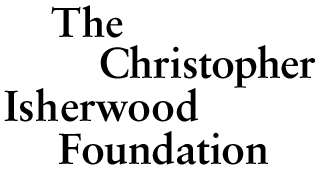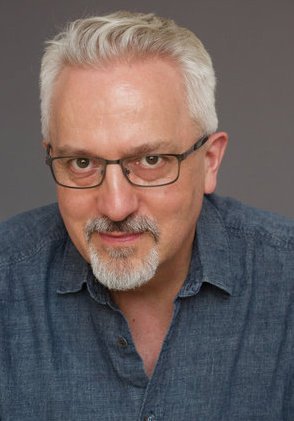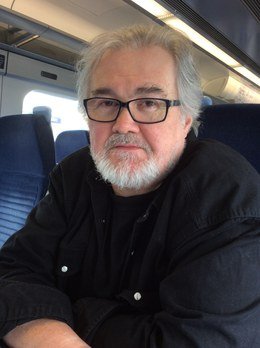Forster Award Turns Fifty
The E. M. Forster Award was set up by Christopher Isherwood and the American Academy of Arts and Letters with royalties from Forster’s novel Maurice. Honoring Forster’s wishes, Isherwood oversaw the posthumous publication of Maurice in 1971; the E. M. Forster Award was founded the following year. So far, the award has enabled 43 British and Irish writers to travel to the United States. We asked them to share their memories.
Blake Morrison (winner of the 1988 Forster Award):
“I used to have dreams of a golden envelope dropping through my letterbox and bringing untold wealth or spectacular honours. The letter that arrived from the American Academy of Arts and Letters in 1987 was the closest I’ve come to that in real life. I can’t remember the colour of the envelope and the cheque it contained was modest. But the honour was certainly spectacular: I’d been given the EM Forster Award, joining a list of previous winners that included Seamus Heaney, Bruce Chatwin, Margaret Drabble and (the year before me) Julian Barnes. My second book of poems had just come out but it was the first, Dark Glasses, from three years previously, that caught the judges’ attention. Among them, I later learned, was Amy Clampitt, whose poetry I greatly admired and who I met in London not long before her death.
The award was a kind of double honour, because it commemorated not only Forster but Christopher Isherwood, who had helped to set it up. Though I’d written only poetry at that point, I had read all their novels. Both, to me, were deeply English writers yet at odds with the narrowness of Middle England. I identified with that and with their need to explore other countries and ways of being.
I’d already travelled to the North America several times, mostly for short vacations and once, after a year in Canada, for a three-month road trip from east to west and back again. Over the next two decades the visits became more regular – not just to cities where friends lived or where I’d a book to promote (New York, Chicago, Boston, San Francisco, LA) but to national parks and remote retreats. Two moments stand out: first, sitting on a beach in Florida in December 1988 and reading in the paper how Pan Am Flight 103 had come down over Lockerbie (there’d been rumours of an imminent bombing in the weeks before Christmas and before opting to fly direct to Miami I’d been offered tickets on that flight); second, in 2007, marrying the daughter of friends in a Californian country club while my wife and youngest son looked on (this wasn’t bigamy – I’d been asked to perform the ceremony and thanks to a one-day special licence issued in San Bernardino I was able to do so).
I’ve never seriously contemplated moving to the US but without the EM Forster Award, I might not have visited as often as I have. More to the point, the recognition it gave helped me through a difficult period in the late 80s and early 90s when I stopped writing poetry altogether. My excuse was a busy day job and a young family. But I sometimes despaired of ever writing again. The award was a succour at those low points – it told me that I shouldn’t give up. And my next book, a memoir of my father that came out in 1993, reached a wider audience in the UK and US than anything I’d written before.”
Alan Hollinghurst (winner of the 1991 Forster Award):
Photo: Robert Taylor
“For me there was something magically gratifying about winning the E. M. Forster Award. My very first publication, in 1975, was a poetry broadsheet, “Isherwood Is at Santa Monica”, which drew on a TV documentary I had seen about Isherwood, but perhaps allowed the reader to think I had met him myself. I never did, but the Berlin books and Lions and Shadows, which had made a great impression on me as a teenager, revealed a lot about him, and later on the riveting third-person candour of Christopher and His Kind was exemplary to a young gay would-be novelist searching for his literary bearings. My first novel, The Swimming-Pool Library, published in 1988, was in part about the buried history of gay lives in Britain in the earlier decades of the century, and had grown directly out of work about gay writers, notably Forster, that I had done as a graduate student in the 1970s. A scene in the book was set at a performance of Britten’s Billy Budd, for which Forster had been one of the librettists, and I saw the novel as a way of placing contemporary freedoms in the longer perspective of British gay history and culture. For it to be given an award set up by Isherwood on the royalties of Forster’s posthumous gay novel was for me both thrilling and humbling.”
Sean O'Brien (winner of the 1993 Forster Award):
“I received the E.M. Forster Award in 1993. This great gift from out of the blue enabled me to travel in the United States with my partner. We went by train from New Orleans to Chicago, via Memphis, a journey evoking the history of American popular music and ending with the vast remains of the Chicago stockyards. It was the world imagined; it was also real. From there we went on to the Twin Cities. Going out to to breakfast with friends near the University of Minnesota, I saw the gold and maroon uniforms of football players in pre-season training – a scene recalling James Wright’s wonderful poem ‘Autumn Begins in Martins Ferry Ohio’. The coincidence led to a long and deep attachment to Wright’s work, out of which some of my own poems of tribute have emerged. That should have been enough, but our friends lived next to Highway 61, which was almost too much to consider. I have still to make the trip to Thunder Bay and Duluth, but you never know. One afternoon we went to see a minor league baseball match between the Winnipeg Goldeneyes and a local team whose name escapes me. Nobody managed to score: I didn’t care, given that the match was played between two freight yards, where mile-long trains slowly came and went as evening deepened. The sense that all this was almost at the point of anachronism lent it an added sweetness. I could go on.
That visit inspired others – most recently we took the train from Portland, Oregon to Chicago. I had been reading J.L. Carr’s strange novel of the northern plains, The Battle of Pollock’s Crossing, and now I turned to James Welch’s Winter in the Blood, a melancholy, compelling story of native American life. Some of the action takes place in Havre, Montana, where we stopped and were briefly interrogated by a Border Patrolman about the mysterious Serbian stamps in our passports. It was night when we passed Fargo, another place evoked (grimly, nightmarishly) in James Wright’s poems. We took a break at St Paul to see our old friends again. This time we visited the James J. Hill library, endowed a century before by the railway magnate. We arrived on the day it was closing down for good, the endowment being exhausted, the staff heartbroken. The handsome old place was matched by the vast, elegant emptiness of the railroad station nearby. Libraries, railroads, the presence of James Wright, who had taught at the University of Minnesota in such a state of drunkenness that John Berryman, of all people, offered to cover his classes. Something was coming to an end, but the imagination would sustain it. The journey was to find its form in a poem. It was thanks to the E.M. Forster Award that I was able to spend time in places that had long occupied my imagination and which, as Robert Frost said of poems, provide ‘a momentary stay against confusion’ in a world which at present can seem to worship at the shrine of its own brutality.
To close on a lighter note, before the award ceremony at the American Academy of Arts and Letters in New York, my minder Paul Theroux spotted Jackie Kennedy Onassis arriving and asked if would like to be introduced. I declined on the grounds (really) that I didn’t think we’d have much in common. Back in the UK when word of what I had thought at the time was a mildly amusing non-event got round I was incredulously berated at length by every woman I knew. How could I be so bloody stupid? I felt as if I would never dine out again. Live and learn, perhaps. But thank you, Christopher Isherwood.”
Geoff Dyer (winner of the 2006 Forster Award):
“It was a great and entirely unexpected honour to receive this award. There are obviously life-transforming prizes such as the Booker or Pulitzer but the benefits of the various smaller prizes should not be under-estimated; they make all the difference in providing the incentive, recognition and financial assistance to make it easier to carry on living a basically untransformed writing life.
The E. M. Forster Award, of course, does offer a specific possibility of transformation, or relocation, by giving writers the opportunity to travel to America. I began spending chunks of time in the U.S. shortly after the award and, for the last eight years, have lived in Los Angeles, just down the road from where Christopher Isherwood lived with Don Bachardy. (My wife and I had a lovely evening with Don at his house shortly after moving here.) Various parts of my books White Sands, The Street Philosophy of Garry Winogrand and The Last Days of Roger Federer (forthcoming) wouldn't have been written -- or at least wouldn't have turned out as they did -- if I had not been based here.
It had always been my ambition to live in California -- now that has been achieved I'm actually (and perversely) looking forward to moving back to England in a few years.”
Adam Foulds (winner of the 2013 Forster Award):
Photo: Charla Jones
“In the decade since I was the happy recipient of the E.M. Forster Award, America has changed. Of course it has: everything has changed. Our derangement deepens. The forests burn. Wealth flows irresistibly upwards. New diseases, new wars break out. Politics has become dangerous and its discourse febrile; the survival of democracy is nowhere a given.
When Christopher Isherwood and W. H. Auden arrived in New York in 1939, they left behind a Europe in even greater peril. More than a journey in hope of an ideal of America, theirs was a flight from ideological struggle, impending violence, and, as many critics saw it, responsibility. Isherwood came to understand this liberation on their transatlantic voyage. In his memoir Christopher And His Kind, he wrote of himself in the third person:
Alone with Wystan, he was able, literally, to speak his mind – to say things which he hadn’t known were in it until the moment of speaking. One morning, when they were walking on deck, Christopher heard himself say: “You know, it just doesn’t mean anything to me any more – the Popular Front, the party line, the anti-Fascist struggle. I suppose they’re okay but something’s wrong with me. I simply cannot swallow another mouthful.” To which Wystan answered: “Neither can I.”
The message that Isherwood heard from, or rather ventriloquized through, the Statue of Liberty as it loomed over their ship arriving into harbour was one of freeing indifference: “Are you quitting or staying? It’s no skin off our nose. We promise nothing. Here, you’ll be on your own.” In the States, Isherwood and Auden found for themselves what Isaiah Berlin defined as ‘negative liberty,’ the freedom from compulsion and constraint. Isherwood went to California for the rest of his life, Auden stayed in New York for almost all of his, and both enjoyed the dazzling plenitude, the dreamy ease of post-war America for people of their race, gender, and class. Auden expressed his gratitude in one poem:
God bless the U.S.A., so large,
So friendly, and so rich.
Now, though, politics has taken a different form. Fascism metastasizes as lies and conspiracy theories while denying its own name. And if there ever was a space outside of ideological strife where, in Isherwood’s words about his new home, a person ‘wouldn’t be a member of a group. He could express himself freely as an individual,’ we have mislaid it. Our smartphones vibrate with the constant news, the spiraling arguments, and advertisers know exactly which groups we belong to. It is America that has pioneered this new reality, this unreality, rather, of alternative information environments, churning content, and monetized attention. America has made the culture in which we all now live and in which literary writing must find its place. And literature is, it seems to me, quite out of step with the priorities and imperatives of this culture. Slowness, thoughtfulness, careful attention and honesty, are all rare and increasingly precious. We are, in T. S. Eliot’s phrase, ‘distracted from distraction by distraction.’ The necessary attendant silence of literature – the silence in which it is composed, the silence in which it is received, off-line, in solitude – interrupts the constant stream of interruptions and gives us a place of repair and reintegration. Literature remains the richest, most resourceful form for expressing what it feels and looks like to be alive in this moment. I really think it gives us the best chance of saving our sanity. Certainly, I need it to make sense of things, to keep beauty and pleasure and coherence alive. I am deeply grateful for the support the E. M. Forster Award provided me as I go on in this endeavour, and to the tutelary spirits of Isherwood and Forster. Both Isherwood and Forster made brilliantly simple, memorable statements of their intent in fiction that have become famous axioms of the art. It would be wonderful to live up to them: to be a camera, to connect.”
With thanks to contributors and to David Kipen.
Complete list of E. M. Forster Award winners to date
1972 — Frank Tuohy
1973 — Margaret Drabble
1974 — Paul Bailey
1975 — Seamus Heaney
1976 — John Stallworthy
1977 — David Cook
1979 — Bruce Chatwin
1982 — F. T. Prince
1984 — Humphrey Carpenter
1986 — Julian Barnes
1988 — Blake Morrison
1989 — A. N. Wilson
1990 — Jeanette Winterson
1991 — Alan Hollinghurst
1992 — Timothy Mo
1993 — Sean O’Brien
1994 — Janice Galloway
1995 — Colm Tóibín
1996 — Jim Crace
1997 — Glyn Maxwell
1998 — Kate Atkinson
1999 — Nick Hornby
2000 — Carol Ann Duffy
2001 — Marina Carr
2002 — Helen Simpson
2003 — Andrew O’Hagan
2004 — Robin Robertson
2005 — Dennis O’Driscoll
2006 — Geoff Dyer
2007 — Jez Butterworth
2008 — John Lanchester
2009 — Paul Farley
2010 — Dan Rhodes
2011 — Rachel Seiffert
2012 — David Mitchell
2013 — Adam Foulds
2014 — Sarah Hall
2015 — Adam Thirlwell
2016 — Sinéad Morrissey
2017 — Robert MacFarlane
2018 — Jon McGregor
2019 — Sally Rooney
2020 — Stephen Sexton







